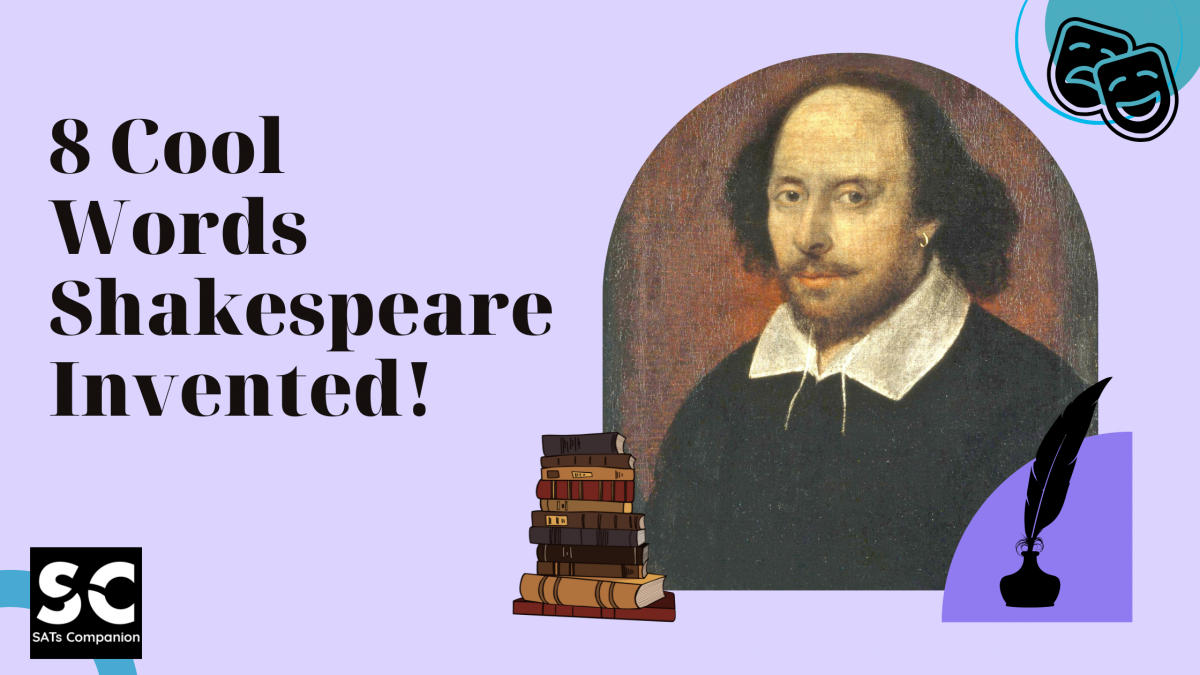Eight cool words Shakespeare Invented!
Undoubtedly, you would have started learning about Shakespeare in the last few years of primary school. Hopefully, by Years 5 and 6, you will have heard or seen one of his plays performed on stage. March 20th to March 26th is Shakespeare week; it is a time for schools everywhere to use part of their day to appreciate and discuss and appreciate his impact. However, you may not know that Shakespeare is the Einstein of the English language! Without Shakespeare, we would not be using 1700 specific words, nor would I be writing this blog post. Thankfully, my boss has allowed me to whittle it down to 8; otherwise, I won’t finish until next Shakespeare week! SATs Companion is here to introduce eight cool words Shakespeare invented.

1) Bedazzle – The word bedazzle has two meanings.
- To impress or charm (usually by force).
- Decorate clothes and accessories using sequins, beads or glitter.
Where did Shakespeare use it? The Taming of the Shrew, Act IV, Scene IV
KATHARINA: Pardon, old father, my mistaking eyes,
That have been so bedazzled with the sun
That everything I look on seemeth green.
How is Shakespeare using it?
Katharina is blinded by the sun. The prefix ‘be’ emphasises the verb dazzle.
What is a verb
A word that shows an action. An example of this is the word stopped.

2) Swagger – Whilst used a lot in Hip-Hop music in the 2000s, Shakespeare was the first person to use the word and its usage dates from 1580 to now! It has two meanings.
- Walk or behave in a self-important way (verb).
- An overbearing way of carrying oneself, usually to the point of arrogance. (noun).
What is a noun?
A word that refers to a thing or group of people i.e. a dog.
Where did Shakespeare use it? Henry V, Act IV, Scene VII
Williams: A rascal that swaggered with me last night—who, if alive and ever dare to challenge this glove, I have sworn to take him a box o’ th’ ear
How is Shakespeare using it?
Shakespeare uses the word “swaggered” to describe the behavior of a rascal who was with Williams the night before. It is used as a verb to show that the rascal was walking in a way that suggests he is full of himself. Williams is not intimidated by how the rascal carries himself and would happily punch him in the ear. OUCH!

3) Shooting star – I bet you did not know Shakespeare invented the word shooting star, and it has two meanings instead of one!
- A fast and tiny moving meteor that burns up once it enters the earth.
- A pink, white or purple plant often seen in North America with petals that curve backwards that look like a shooting star.
Where did Shakespeare use it? Richard II, Act II, Scene IV
Earl of Salisbury: Ah, Richard, with the eyes of heavy mind I see thy glory like a shooting star. Fall to the base earth from the firmament.
How is Shakespeare using it?
By comparing King Richard III’s glory to a shooting star, the Earl of Salisbury suggests that King Richard’s glorious position will be gone from him quicker than expected, like a meteor burning up in the sky upon entering the earth.

4) Cold-Blooded – This word means something very different for humankind and animal kind! Do your best not to get confused between the two. Mind you – you may want to avoid anything cold-blooded altogether!
- Animals that cannot control their body heat to keep and maintain warmth; so must switch environments to stay warm. A cold-blooded creature is always cold until it enters somewhere warmer, for instance, a lizard.
- An emotionless person who does awful things without considering other people’s feelings.
Where did Shakespeare use it? King John, Act III, Scene I
Constance of Penthièvre: Thou cold-blooded slave,
Hast thou not spoke like thunder on my side?
How is Shakespeare using it?
Constance is furious at those supposedly loyal to her going back and forth from one kingdom to another instead of remaining consistent. Nobody is considering Constance’s feelings. I haven’t read King John, but I am confident they are not lizards! Please prove me wrong.

5) Fashionable – Well, I can tell you what it means already. Something I am not! I can tell you who is fashionable, Shakespeare! Forget Cara Delevingne, she may be a world-renowned model, but Shakespeare is true fashion! Well, at least for this week.…
- Something or someone that is popular during a specific time period.
- Establishing trends.
- A place full of stylish people.
Where did Shakespeare use it? Troilus and Cressida, Act III, Scene III
Ulysses: For time is like a fashionable host that slightly shakes his parting guest by the hand.
How is Shakespeare using it?
The word fashionable itself is an adjective; however, Shakespeare uses the simile of a ‘fashionable host’ of a party or event to suggest that time will leave you standing alone quickly because a host of something typically cannot attend to everyone.
What is an adjective?
A word describing a noun. For example, a small dog.
What is a simile?
A phrase comparing two unlike things using like or as, for instance, life is like a box of chocolates.

6) Admirable – You are admirable if you made it this far. Don’t know what it means? Well…
- Something or someone who deserves high levels of praise.
Where did Shakespeare use it? Hamlet, Act II, Scene II
Hamlet: What a piece of work is a man! How noble is reason! how infinite in faculty! in form, in moving, how express and admirable!
How is Shakespeare using it?
Shakespeare uses the word admirable as an adjective to describe the nature of man. However, he describes man at the very start of the sentence as a piece of work, someone that is not admirable. Shakespeare likes to disagree with himself a lot, and that’s why SATs Companion loves him!
What is a piece of work?
An unpleasant person.

7) Howl – Shockingly, this sound is made by both dogs and humans. I once howled at a dog, but it ended up running away. Poor me.
- A long and consistent cry made by dogs or humans indicating anger, unhappiness or pain.
- A loud gust of wind that blows incredibly hard.
Where did Shakespeare use it? King Lear, Act V, Scene X
King Lear: Howl, howl, howl, howl! O! you are men of stones:
Had I your tongues and eyes, I’d use them so
That heaven’s vaults should crack. — She’s gone forever!
How is Shakespeare using it?
Shakespeare is using howl as a verb to describe King Lear’s pain. The men with King Lear in his kingdom are just standing around awkwardly whilst King Lear is screaming for his dead daughter. I read King Lear many years ago and I don’t want to be in that kingdom that’s for sure.

8) Gossip – I don’t know whether you heard that William Shakespeare introduced 1700 words to the English language. Wait, have you already heard that one? Oops!
- A conversation about other people’s private affairs, usually involving things that might not be true.
- To engage in gossip.
Where did Shakespeare use it?
Duke Solinus: With all my heart, I’ll gossip at this feast. The Comedy of Errors, Act V, Scene I
How is Shakespeare using it?
Since Duke Solinus is using all his heart to gossip at the feast, he won’t engage in a tiny bit of it; he is not holding back! He will be crafting the worst possible insults. I would not like to be the person he is gossiping about!
Without Shakespeare, the English language would not be the same, nor would you be reading this delightful blog post, which I think is the teensiest bit more important than the millions of authors across the globe he has influenced! If you know what other words William Shakespeare has invented, comment below or message us on SATs Companion’s Twitter account!



